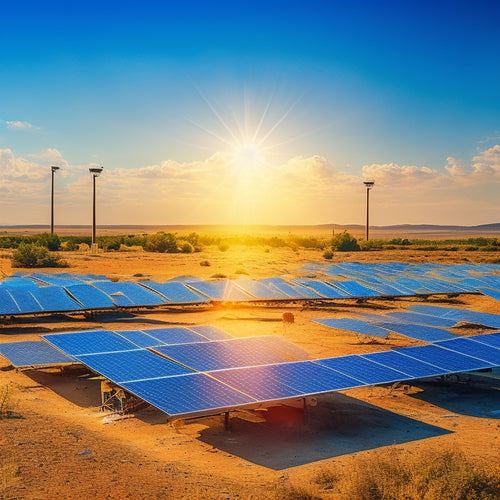
Cost of Battery Backup for Solar Panels
Share
You'll likely pay between $5,000 and $20,000 or more for a high-quality battery backup system, depending on the type and size of the batteries, as well as the overall capacity of the system. This investment can provide reliable power during outages, enhance grid independence, and even increase your property value. When choosing a system, consider factors like deep cycle battery type, depth of discharge, and lifespan guarantees to guarantee you get the right fit for your needs. As you investigate your options, you'll want to examine the fine details to optimize your return on investment and achieve the peace of mind that comes with emergency backup power.
The Essentials
- The cost of a battery backup system for solar panels can range from $5,000 to $20,000 or more, depending on the type and quality of batteries.
- Deep cycle battery life expectancy ranges from 5 to 15 years, affecting the overall cost of the system over its lifespan.
- Battery type, quality, and maintenance significantly impact the system's efficiency, performance, and cost-effectiveness.
- A well-designed backup plan, including proper installation and maintenance, can prevent losses from food spoilage and electronics damage during outages.
- Investing in a battery backup system can increase property value, with some homes selling at a premium of 3% to 10% due to the added feature.
Reliable Power During Outages
When the grid goes down, you need a reliable source of power to keep your essential appliances running.
A well-designed battery backup system guarantees you have power during outages, giving you peace of mind and minimal disruption to your daily routine.
By opting for an Emergency Backup Solar Power System, you can enjoy a cost-effective alternative to traditional generators, reducing your reliance on fossil fuels and lowering your utility bills over time.
With a backup plan, you can prioritize your energy needs and stay connected when it matters most.
Power During Outages
As storms and wildfires increasingly disrupt the grid, homeowners with solar panels are seeking reliable power during outages. You're likely one of them, wanting to guarantee your family's safety and comfort when the grid goes down.
With a battery backup system, you can achieve grid independence and energy autonomy, providing power to your critical loads even when the utility grid is offline. By leveraging lithium ion batteries, you can store excess energy generated during off-peak hours for later use Power Grid Resiliency.
During an outage, your solar panels will continue to generate electricity, but without a battery backup, that energy will be wasted. A battery backup system stores excess energy generated by your solar panels during the day, allowing you to use it at night or during an outage.
This means you can power essential appliances like refrigerators, lighting, and medical equipment, keeping your family safe and comfortable. With a battery backup, you'll have peace of mind knowing you're prepared for the next grid outage.
You'll be able to maintain your independence and autonomy, relying less on the grid and more on your own renewable energy system.
Backup Plan Essentials
In conjunction with your solar panel system, a well-designed battery backup plan serves as the linchpin to reliable power during outages, guaranteeing your family's comfort and safety.
As you develop your backup plan, it's vital to take into account the critical components that will keep your lights on and your appliances running when the grid goes down. A reliable battery backup system can prevent costly losses due to food spoilage and damage to electronics, and also guarantees continuous power supply for vital systems like medical equipment and security systems Power Outage Protection.
First, you'll need to determine your energy needs during an outage. This involves conducting a cost analysis to identify the indispensable appliances and devices you want to power.
Will you need to keep your refrigerator running, or can you prioritize lighting and communication devices? Once you've identified your energy requirements, you can select the right battery size and type to meet those needs.
When it comes to installation considerations, you'll want to think about the location and configuration of your battery bank.
Will you install the batteries indoors or outdoors? How will you guarantee they're protected from extreme temperatures and physical damage? By carefully evaluating these factors, you can create a reliable backup plan that provides peace of mind and independence from the grid.
Increased Property Value
You'll likely see a significant increase in your home's resale price with a battery backup system for your solar panels, as it's a highly desirable feature for environmentally conscious and tech-savvy homebuyers.
In fact, many homeowners are already investing in renewable energy systems to reduce their carbon footprint and enhance their property's appeal.
This enhanced property attractiveness can give you a competitive edge in the market, setting your home apart from others in the neighborhood.
Boosted Home Resale Price
Installing a battery backup for your solar panels can greatly enhance your home's resale price. By investing in a battery storage system, you're not only ensuring energy independence but also increasing your property's appeal to potential buyers.
This appeal translates to a higher resale value, which means you can recoup a significant portion of your investment when you decide to sell.
Studies have shown that homes with solar panels and battery backup systems sell for a premium compared to those without. This premium can range from 3% to 10% of the home's value, depending on the location and the quality of the system.
For example, if your home is worth $500,000, a 5% premium would add $25,000 to the sale price.
When you consider the investment returns on a battery backup system, it's clear that it's a smart move for homeowners who want to increase their property value and achieve energy independence.
Enhanced Property Attractiveness
As you reap the benefits of an increased home resale price, a battery backup for your solar panels also enhances your property's attractiveness, driving up its worth even further. This added appeal stems from the solar installation benefits, including energy independence and reduced reliance on the grid.
Prospective buyers are drawn to properties that offer a sustainable and self-sufficient energy solution, making your home more desirable and advantageous.
By integrating a battery backup into your solar panel system, you're showcasing your commitment to eco-friendliness and energy efficiency. This connects with environmentally conscious buyers who prioritize sustainability and are willing to pay a premium for properties that align with their values.
Furthermore, the added security of having a reliable energy source during power outages only adds to the appeal, making your property more attractive to potential buyers.
Ultimately, the enhanced property attractiveness resulting from a battery backup for your solar panels translates to increased property worth, making your investment more lucrative and desirable.
Deep Cycle Battery Type
When selecting a deep cycle battery type for your solar panel system, you'll want to take into account the battery life expectancy, which can range from 5 to 15 years depending on the manufacturer and quality.
Additionally, it's crucial to take into account the overall efficiency of your solar power system, including the solar panel battery and inverter, to guarantee optimal energy storage and reduce reliance on the grid.
You'll also need to reflect on the maintenance requirements, as some deep cycle batteries need regular watering and equalization charging to guarantee optimal performance.
Battery Life Expectancy
Operating a solar panel system with a battery backup requires careful consideration of the battery's lifespan, as it substantially impacts the overall cost and performance of the system.
You'll want to understand how long your deep cycle battery will last, as it directly affects your energy efficiency and overall freedom from the grid.
In general, deep cycle batteries designed for solar panel systems can last anywhere from 5 to 15 years, depending on the quality of the battery technology and how well you maintain it.
A high-quality deep cycle battery can provide you with a longer lifespan, but it also comes at a higher upfront cost.
You'll need to weigh the benefits of a longer lifespan against the increased cost.
When evaluating battery life expectancy, you should consider factors such as the battery's depth of discharge (DOD), the number of charge cycles, and the operating temperature.
Maintenance Requirements
Proper maintenance is key to extending the life of your deep cycle battery, and you'll need to stay on top of various tasks to guarantee peak performance.
Battery maintenance is vital to guarantee your solar panel system operates efficiently and effectively. You'll need to perform routine inspections every 1-3 months to check the battery's state of charge, voltage, and temperature. During these checks, look for signs of wear, such as corrosion or loose connections, and address them promptly.
In addition, you'll need to confirm the battery is kept in a clean, dry environment, away from extreme temperatures. You should also monitor the battery's water levels, if applicable, and top them off as needed.
Moreover, you'll need to update the battery's software and firmware regularly to confirm you have the latest features and improvements.
Check Battery Depth of Discharge
You need to monitor your battery's depth of discharge (DOD) regularly to guarantee its health and longevity.
Checking DOD helps you identify if your battery is operating within its recommended limits, which typically range from 20% to 80% DOD.
A well-maintained battery is essential for a reliable renewable energy solution and to maximize energy harvesting.
Battery Health Check
Most solar panel systems rely on deep cycle batteries to store excess energy generated during the day for use at night or during power outages. As a solar panel system owner, you need to verify your batteries are functioning efficiently to get the most out of your investment. A battery health check is vital to monitor your battery's performance and extend its lifespan.
You can perform a battery health check by tracking your battery's state of charge, voltage, and temperature. This will help you identify any potential issues before they affect your system's overall performance.
It's also important to keep an eye on your battery's depth of discharge (DOD), which refers to how much of its capacity is used. A deeper DOD can reduce your battery's lifespan, so it's recommended to keep it between 20% to 50%.
Regularly checking your battery's health will help you identify areas for improvement, such as adjusting your charging cycles or replacing old batteries. By doing so, you can enhance your battery performance, increase the number of charge cycles, and enjoy a reliable source of energy when you need it most.
Depth of Discharge Limits
As the battery's state of charge fluctuates, its depth of discharge (DOD) plays a critical role in determining its overall lifespan. You need to understand that DOD is the percentage of a battery's capacity that's been drained before recharging. For instance, if you've used 30% of your battery's capacity, the DOD is 30%.
When you regularly discharge your battery to 80% or more, you're reducing its lifespan. This is because deep discharges put more stress on the battery's internal components, causing them to degrade faster. The type of battery chemistry also affects the recommended DOD. For example, lead-acid batteries can handle deeper discharges than lithium-ion batteries.
To extend your battery's lifespan, it's important to limit the DOD. Most manufacturers recommend keeping the DOD between 20% to 50%. This allows for a decent amount of usable capacity while minimizing wear and tear.
Longer Lifespan Guarantee
When you're evaluating the cost of battery backup for your solar panels, you'll want to take into account the extended battery warranty offered by some manufacturers.
This longer lifespan guarantee can provide you with added peace of mind, as it guarantees that your battery will perform at a certain level for an extended period.
Typically, a longer warranty period translates to a higher upfront cost, but it can also reduce your overall expenditure on replacement batteries over time.
Extended Battery Warranty
Your solar panel battery backup system's reliability is contingent upon the battery's lifespan, which is why an extended battery warranty is crucial.
With an extended warranty, you're protected against battery failures that can occur beyond the standard warranty period, typically ranging from 5 to 10 years. This extended protection provides you with peace of mind, knowing that you're covered in case your battery fails prematurely.
The extended warranty benefits are twofold.
To begin with, it guarantees that you're not burdened with unexpected replacement costs, which can be substantial.
Additionally, it gives you access to battery replacement options that mightn't be available otherwise. This means that if your battery fails, you can have it replaced with a new one, assuring that your solar panel system continues to function at its best.
Frequently Asked Questions
Can I Use a Battery Backup With an Existing Solar Panel System?
You can retrofit a battery backup to your existing solar panel system, but you'll need to take into account battery integration and installation factors, such as compatibility, sizing, and wiring, to guarantee a seamless and efficient energy storage solution.
How Long Does a Battery Backup System Typically Last?
You'll be thrilled to know that 70% of battery backup systems last up to 15 years! When you maintain your system properly, you can expect a typical battery lifespan of 10-15 years, with minimal maintenance requirements ensuring your freedom from grid dependence.
Are Battery Backup Systems Compatible With All Solar Panels?
You'll find that most battery backup systems are compatible with various solar panels, but it's essential to contemplate specific battery types and installation requirements to guarantee seamless integration and peak performance.
Do I Need a Special Permit to Install a Battery Backup System?
As you commence on the expedition to energy independence, you'll find that installation requirements vary by state and locality, so you'll need to steer through battery system regulations, securing necessary permits before connecting your system to the grid.
Can I Charge My Electric Vehicle With a Battery Backup System?
You can charge your electric vehicle with a battery backup system, exploring various charging options that prioritize battery efficiency, ensuring a seamless and sustainable experience that liberates you from grid dependence.
Final Thoughts
As you weigh the cost of a battery backup for your solar panels, remember that it's an investment in more than just electricity. It's a guarantee of reliable power during outages, increased property value, and a longer lifespan for your system. Imagine the peace of mind that comes with knowing your home is lit and comfortable, even when the grid goes dark. With the right deep cycle battery and careful monitoring of its depth of discharge, you'll be enjoying the fruits of your investment for years to come.
Related Posts
-

Top Portable Refrigerators for Camping Adventures
When you're camping, having a reliable portable refrigerator can make all the difference for keeping your food fresh ...
-

What Happens Without a Charge Controller in Solar Panels
Without a charge controller in your solar panel system, you risk overheating batteries due to overcharging, which can...
-

Top 10 Off Grid Camping Gear Must-Haves
When you're off-grid camping, the right gear is crucial for a smooth expedition. Start with a durable, weather-resist...


